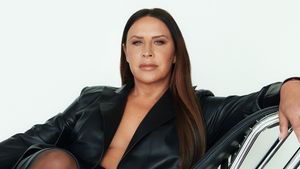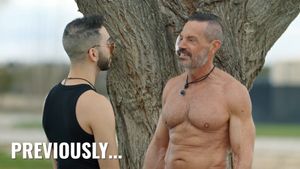Treatment GuideJust DiagnosedSex & DatingAfrican AmericanStigmaAsk the HIV DocPrEP En EspañolNewsVoicesPrint IssueVideoOut 100
CONTACTCAREER OPPORTUNITIESADVERTISE WITH USPRIVACY POLICYPRIVACY PREFERENCESTERMS OF USELEGAL NOTICE
© 2025 Pride Publishing Inc.
All Rights reserved
All Rights reserved
By continuing to use our site, you agree to our Private Policy and Terms of Use.
The first time Sonja Ortman got pregnant, in 1996, she was so afraid she'd transmit HIV to her baby that she chose to terminate her pregnancy. Pregnant again, in 2004, she was confident enough by then with the advancements made in HIV medicine to jump into the unknown. She returned to the obstetrician she saw during her first pregnancy, she says, 'to make the whole experience come full circle.' She went back and forth about whether to have a cesarean section, hoping for a vaginal birth instead but knowing it increased the risk of transmitting the virus to her infant during delivery. When her viral load spiked in her ninth month of pregnancy she felt pressured to make her decision. Her doctor at Planned Parenthood in Milwaukee posed one question to help her decide about her chances for transmitting the virus via either method: 'What do you want? Do you want 1% to 2%, or do you want one one-hundredths of a percent?' 'I said, 'Doctor, why didn't you tell me this nine months ago?' ' she recalls in an amused but still exasperated voice. 'So that was just the whole start of the parenting choices that we make,' the 41-year-old says. 'It's not about me as a woman experiencing childbirth; it's about the child.' A C-section brought her a healthy baby boy, Liam. And despite her admitted frustrations, she has a fond memory of her beloved doctor on that morning: 'He was as calm and cool as the orange Popsicle he was eating as he walked into the room in his scrubs.' No one ever said motherhood was going to be easy, especially when it's the mom who puts everyone else in the family first, even before her own needs. This is especially true for women already coping with HIV. HIV-positive women suffer from higher rates of depression, for starters -- in no small part because of the effects of social stigma that follows HIVers. And at least one study has found that mothers living with HIV have particularly poor medication-adherence rates, with only about half the women in the study taking their meds properly. Debra Murphy, a psychologist at the University of California, Los Angeles, who researches HIV-positive mothers and was the lead author of the adherence study, says, 'If you're ill and depressed, that can have a negative impact on your kids [see related article 'Child Monitor.'] It's important for HIV-positive mothers to take care of themselves -- from medication adherence, keeping appointments, tending to their mental health, and not letting stigma influence the family.' Tonya Rasberry, a 35-year-old peer counselor at Babes Network, which provides social services to women with HIV in the Seattle area, might be an expert on how best to take care of herself and her family simultaneously. But she still falls into familiar traps, she admits. 'Moms always put all their stuff on the back burner in order to put their family forward,' Rasberry says. 'I've done it. I've canceled my HIV doctor appointments because I wanted to go to my son's basketball game.' Yolanda Rodriguez-Escobar, the executive director of Mujeres Unidas Contra el SIDA, an AIDS service organization that targets HIV-positive Latinas in San Antonio, repeats an old refrain, one akin to the airplane safety instruction about putting your oxygen mask on first before assisting others: 'You can't take care of anybody if you're not healthy.' Out of the Mouths of Babes Sometimes it's the kids who know best when it comes to self-care, Ortman says. Last year she flew home to Wisconsin in a rush after a week of work in Washington, D.C., so that she could be with 5-year-old Liam for Halloween. Even though she slept all day to rest up, she was still wiped out by the evening. When she reluctantly proposed going out for trick-or-treating, Liam was clearly thinking of his mom's needs. 'He told me, 'Mom, it's too cold and windy,' ' she says. 'He was the voice of reason, and I let it be OK to take care of myself.' Her husband put dinner on, and the family curled up with It's the Great Pumpkin, Charlie Brown. 'Kids are wise,' Rodriguez-Escobar says. 'We as parents oftentimes don't give our kids credit for being astute or smart enough to say, 'Wait a minute. This is wrong. Mom, you need to take care of yourself.'' Acintia Robinson, a 46-year-old from San Diego, has also benefited from such precocious wisdom. She says she always wanted to be the perfect 'TV mom,' like on The Brady Bunch or The Partridge Family. After she was raped and infected with HIV in 1995, she says, 'I just knew my whole world had crumbled.' All her plans for the future, including a bid for city council, she recalls, seemed to fall away as she sunk into a deep depression. 'My 12-year-old daughter,' she says, 'told me at the time, 'Mom, you're such a strong person. You can do this!' And I just looked at her real strange, like, How do you know? She saw something I didn't know at that time. So I gathered up my strength, I took my -- what we call -- lemons, and I turned them into lemonade!' And Robinson found a new calling. For the past 14 years she has worked as an HIV advocate and peer educator. 'I'm really thankful for all my kids,' she says, 'because they don't look at it as I did something wrong or something was done wrong to me. They look at it like, 'My mom's an advocate, and she's out there fighting for the rights of people living with HIV and AIDS!' ' It's the Little Things HIV can demand that moms juggle more than their fair share of lemons. Chicagoan Joann Montes, who at 45 has been mother to six children, one of whom died of cancer not long after her own HIV diagnosis, weathered a perfect storm when she was working as a bank teller. It was the day of a daughter's parent-teacher conference, and she was trying to close down her station and get out the door. But the Friday rush wouldn't give her a break. At the time one of her anti-HIV meds was causing her to have terrible diarrhea. She was forced to bolt in the middle of a transaction, leaving an angry customer behind. She didn't make it to the restroom in time, though, and ended up in tears. Nevertheless, she rushed home, cleaned up, changed, and got to the conference. 'I made it!' she says with pride. 'I did not die of embarrassment.' Life struggles with the virus aren't only physical and mental; for a family trying to get by, they can drain the budget. Ortman works for a company that helps keep medical societies financially sound. Her husband, who is also HIV-positive, works as a case manager assisting people who are on Medicaid. Despite being professional experts on managing medical expenses, their own health bills have still landed them in a bankruptcy filing. Meanwhile, there's the thorny issue of public stigma. Living in rural Wisconsin, Ortman feels she needs to keep a tight lid on her HIV status and wonders how to handle the issue as Liam gets older. On that note, UCLA's Debra Murphy has a bit of wisdom to offer: 'You can't change the world, but you can change how the child sees you coping with it.' Robinson, a model out-and-proud HIVer, says her kids, while supportive of her, still wrestle with the public nature of their mom's HIV status. Her teen daughter has asked her to be careful not to speak at any local schools where word might get back to her peers. As for her grown son, she says, 'He'll call and say, 'Mom, I'm wearing a red shirt today, and I'm making sure everyone in the store knows today's World AIDS Day.' But he won't tell people, 'My mother is HIV-positive.' ' Rasberry recommends that HIV-positive moms get their kids involved in activities with other families who have HIV-affected parents to help normalize their growing-up experience. Babes, for one, arranges outings for moms and their kids, giving them picnics or free trips to the zoo and the aquarium. Rodriguez-Escobar goes so far to suggest getting older kids involved with peer-education work of their own. Rasberry says that HIV has, in fact, made her a better parent: 'I think I appreciate life more because I know nothing's promised. It's helped me be more open with my kids because I don't ever want to say I didn't teach them this or I didn't tell them that.' Meanwhile, Ortman is taking time to enjoy the ongoing miracle of her son's birth. 'I'm not going to spoil him rotten,' she says, 'but I am going to let him know, 'Hey, you're a special kid.' '
From our Sponsors
Most Popular
Why activist Raif Derrazi thinks his HIV diagnosis is a gift
September 17 2024 12:00 PM
How fitness coach Tyriek Taylor reclaims his power from HIV with self-commitment
September 19 2024 12:00 PM
Out100 Honoree Tony Valenzuela thanks queer and trans communities for support in his HIV journey
September 18 2024 12:00 PM
The freedom of disclosure: David Anzuelo's journey through HIV, art, and advocacy
August 02 2024 12:21 PM
Creator and host Karl Schmid fights HIV stigma with knowledge
September 12 2024 12:03 PM
From ‘The Real World’ to real life: How Danny Roberts thrives with HIV
July 31 2024 5:23 PM
Eureka is taking a break from competing on 'Drag Race' following 'CVTW' elimination
August 20 2024 12:21 PM
California confirms first case of even more deadly mpox strain
November 18 2024 3:02 PM
Plus: Featured Video
Latest Stories
A camp for HIV-positive kids is for sale. Here's why its founder is celebrating
January 02 2025 12:21 PM
This long-term HIV survivor says testosterone therapy helped save his life.
December 16 2024 8:00 PM
'RuPaul's Drag Race' star Trinity K Bonet quietly comes out trans
December 15 2024 6:27 PM
Ricky Martin delivers showstopping performance for 2024 World AIDS Day
December 05 2024 12:08 PM
AIDS Memorial Quilt displayed at White House for the first time
December 02 2024 1:21 PM
Decades of progress, uniting to fight HIV/AIDS
December 01 2024 12:30 PM
Hollywood must do better on HIV representation
December 01 2024 9:00 AM
Climate change is disrupting access to HIV treatment
November 25 2024 11:05 AM
Post-election blues? Some advice from mental health experts
November 08 2024 12:36 PM
Check out our 2024 year-end issue!
October 28 2024 2:08 PM
Meet our Health Hero of the Year, Armonté Butler
October 21 2024 12:53 PM
AIDS/LifeCycle is ending after more than 30 years
October 17 2024 12:40 PM
Twice-yearly injectable lenacapavir, an HIV-prevention drug, reduces risk by 96%
October 15 2024 5:03 PM
Kentucky bans conversion therapy for youth as Gov. Andy Beshear signs 'monumental' order
September 18 2024 11:13 AM
Study finds use of puberty blockers safe and reversible, countering anti-trans accusations
September 11 2024 1:11 PM
Latinx health tips / Consejos de salud para latinos (in English & en espanol)
September 10 2024 4:29 PM
The Trevor Project receives $5M grant to support LGBTQ+ youth mental health in rural Midwest (exclusive)
September 03 2024 9:30 AM
Introducing 'Health PLUS Wellness': The Latinx Issue!
August 30 2024 3:06 PM
La ciencia detrás de U=U ha estado liberando a las personas con VIH durante años
August 23 2024 2:48 PM
















































































